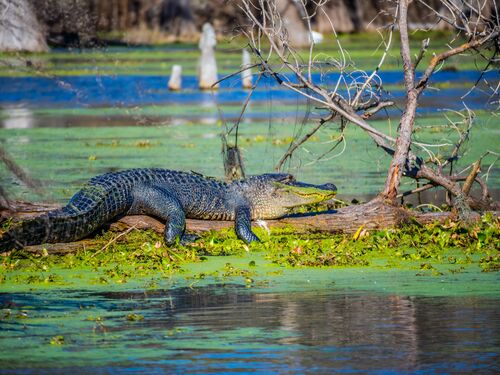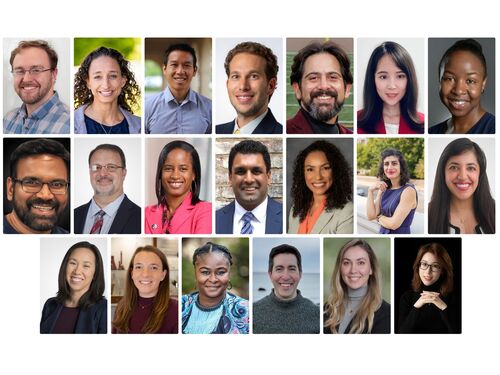Gulf Research Program and NOAA Award $4 Million to Support Environmental Literacy for Community Resilience
News Release
By Pete Nelson
Last update October 22, 2025
WASHINGTON — The National Academies of Sciences, Engineering, and Medicine’s Gulf Research Program (GRP) and the National Oceanic and Atmospheric Administration’s Environmental Literacy Program are partnering with $4 million in investments to support six place-based educational projects across the Gulf States — Texas, Louisiana, Mississippi, Alabama, and Florida. The awarded projects aim to help people better understand the connections between science, the environment, and their communities, building resilience to environmental challenges while fostering stronger stewardship of local ecosystems.
“We are proud to partner with NOAA’s Environmental Literacy Program to support projects that place communities at the center of resilience-building,” said Karena Mothershed, director of GRP’s Board on Gulf Education and Engagement. “Together, these projects reach beyond traditional educational settings to engage Gulf Coast residents of all ages in solutions-oriented activities that strengthen environmental literacy, foster collaboration, and build long-term resilience across the region.”
These projects seek to involve participants in local community-resilience efforts, enable residents to take action in their communities, and support current and future leaders to address complex environmental challenges.
The awarded projects are:
Project Title: Resilient Construction and Verified Community Training — Credentialing for Recovery, Empowerment, Advancement, Training, and Education
Project Director: Jason von Meding, University of Florida
Project Location: Jacksonville, Gainesville, and Cedar Key, Florida
Award Amount: $577,320
Project Summary:
This project will develop and pilot a place-based, gamified training and credentialing system that prepares adults — regardless of prior construction experience — to support safe, effective, and locally grounded disaster recovery and resilient construction. As disasters intensify due to climate change, communities increasingly rely on residents to assist in response and rebuilding. Yet most adults lack the foundational knowledge to contribute safely in a disaster recovery environment. Developed through community-centered work in Jacksonville, Gainesville, and Cedar Key, the program will use simulations and scenario-based learning to teach safety, recovery coordination, and resilient design. A knowledge-sharing platform will allow participants to exchange solutions and lessons learned, creating a collaborative resilience network. Led by the University of Florida and partners, the initiative advances environmental literacy, civic participation, and workforce readiness, offering a scalable model for adult education at the intersection of climate adaptation, recovery, and construction.
Project Title: After the Rain: Envisioning New Orleans’ Water Future Through Science and Music
Project Director: Claire Anderson, Ripple Effect Water Literacy Project
Project Location: New Orleans, Louisiana
Award Amount: $715,937
Project Summary:
Building on the successful Puddles to Floods Summer Institute, funded by the National Academies of Sciences, Engineering, and Medicine, this project expands place-based water literacy education for New Orleans students. Rising fifth graders will participate in hands-on science instruction to engage meaningfully with stormwater flooding in New Orleans, while the new After the Rain music lab uses songwriting to connect students’ lived experiences with a deeper understanding of flooding and amplify their voices as young environmental thinkers. A community steering committee will guide curriculum design to ensure content reflects local realities, while water literacy celebrations for students’ families will feature student performances and exhibits. By combining science, the arts, and community engagement, the program deepens student understanding of resilience and builds parental awareness of citywide resilience efforts — and fosters greater investment in children’s water literacy education.
Project Title: Youth Climate Leadership and Workforce Development Initiative for Community Resilience in Osceola County
Project Director: Frank Weaver, Alianza Center
Project Location: Osceola County, Florida
Award Amount: $691,702
Project Summary:
Alianza Center will empower youth in Osceola County through hands-on urban forestry activities that support environmental resilience, community health, and economic opportunity. In neighborhoods in Kissimmee, the lack of tree canopy contributes to higher energy bills, poorer air quality, and elevated health risks due to extreme heat. These challenges are further compounded by limited access to green space, limited workforce pathways for youth, and heightened exposure to the impacts of climate change. Participants in this program will engage in tree planting, canopy maintenance, and environmental restoration while exploring career pathways in the green jobs economy. Working with local partners, the program addresses the urgent need for shade, clean air, and cooling in rapidly urbanizing Kissimmee. By combining workforce development with environmental action, the initiative improves community resilience while equipping youth with skills for long-term leadership and career growth in sustainability fields.
Project Title: Empowering Youth for Urban Resilience: Hurricane and Stormwater Solutions in Baytown, Texas
Project Director: Virginia “Ginger” McKay, Goose Creek Consolidated Independent School District
Project Location: Baytown, Texas
Award Amount: $690,000
Project Summary:
This three-year project equips students in Goose Creek Consolidated Independent School District with the tools to explore and address local flooding and stormwater challenges. Students will analyze NOAA storm data, conduct fieldwork, and use GIS tools, while collaborating with partners including Texas A&M Galveston, the Baytown Wetlands Center, ExxonMobil, and Lee College. Project deliverables include public service announcements, an interactive resilience dashboard, and a student-led Urban Resilience Summit. The project also includes the distribution of 25 $1,000 student scholarships, which will be awarded to student leaders who demonstrate civic engagement, peer leadership, and public presentation skills at events. The initiative advances scientific literacy, career readiness, and community preparedness in a flood-prone region while serving as a model for integrating resilience into secondary education.
Project Title: FLOWS: FloodSmart Southeast Texas Youth Initiative for Environmental Literacy and Community Resilience
Project Director: Thinesh Selvaratnam, Lamar University
Project Location: Port Arthur, Beaumont, Orange Metropolitan Area, Texas
Award Amount: $678,003
Project Summary:
The FLOWS program, led by Lamar University and regional partners, empowers students in Southeast Texas to design and build rain gardens that reduce flooding while serving as outdoor classrooms. Students in grades eight–10 will study hydrology, runoff, and plant ecology through Texas Essential Knowledge and Skills (TEKS)-aligned lessons and field investigations, then apply their learning to site assessments and the design, construction, and monitoring of rain gardens at schools. Each year, teachers participate in summer training to gain hands-on experience in environmental science instruction. The development of a modular rain garden teaching kit ensures access for schools with limited outdoor space. Supported by community organizations and industry partners, FLOWS will reach over 300 students and 20 teachers, install three rain gardens, and create scalable tools that build environmental literacy and resilience.
Project Title: Co-Designing Resiliency: From Monitoring to Making Change with Citizen Science Water Data
Project Director: Mona Dominguez, Auburn University
Project Location: Auburn, Alabama
Award Amount: $739,982
Project Summary:
This project empowers Alabama communities to use 30 years of Alabama Water Watch citizen science data to identify and address local water quality problems. Community members will be empowered to play a leadership role in the protection and restoration of their watersheds by increasing their understanding and skills in water quality data analysis, interpretation, and application. Working with Auburn University researchers, watershed groups will analyze data, co-design solutions, and implement community-led water protection strategies. Activities include a needs assessment, new online tools, and a hackathon bringing together researchers and community members to develop practical responses to local water quality issues that pose a hazard to community and environmental health. By highlighting the value of local knowledge and citizen participation, the project creates a replicable model for turning data into action, strengthening watershed health, and advancing resilience across Alabama and beyond.
The National Academies’ Gulf Research Program (GRP) is an independent, science-based program founded in 2013 as part of legal settlements with the companies involved in the 2010 Deepwater Horizon disaster. The GRP’s mission is to develop, translate, and apply science to enhance the safety of offshore energy, the environment, and the well-being of the people of the Gulf region for generations to come. It supports innovative science, guides data design and monitoring, and builds and sustains networks to generate long-term benefits for the Gulf region and the nation.
The National Academies of Sciences, Engineering, and Medicine are private, nonprofit institutions that provide independent, objective analysis and advice to the nation to solve complex problems and inform public policy decisions related to science, engineering, and medicine. The National Academies operate under an 1863 congressional charter to the National Academy of Sciences, signed by President Lincoln.
Contact:
Pete Nelson, Director of Public Engagement and Communications
Gulf Research Program
email PNelson@nas.edu
More like this
Discover
Events
Right Now & Next Up
Stay in the loop with can’t-miss sessions, live events, and activities happening over the next two days.
NAS Building Guided Tours Available!
Participate in a one-hour guided tour of the historic National Academy of Sciences building, highlighting its distinctive architecture, renowned artwork, and the intersection of art, science, and culture.




